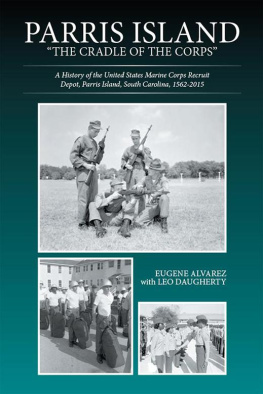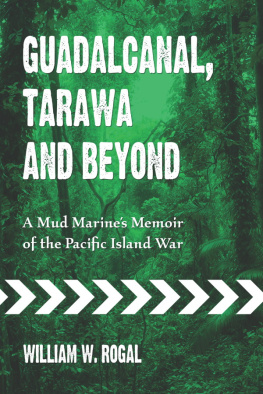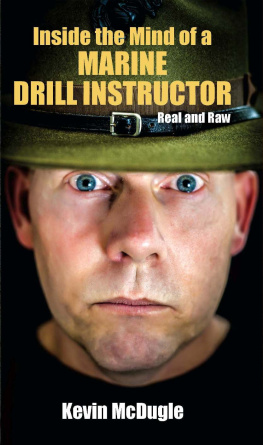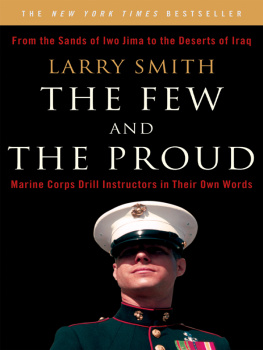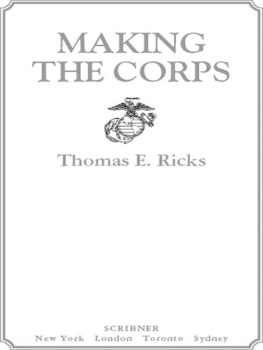PARRIS ISLAND
THE CRADLE OF THE CORPS
A History of the United States Marine Corps Recruit Depot, Parris Island, South Carolina, 1562-2015
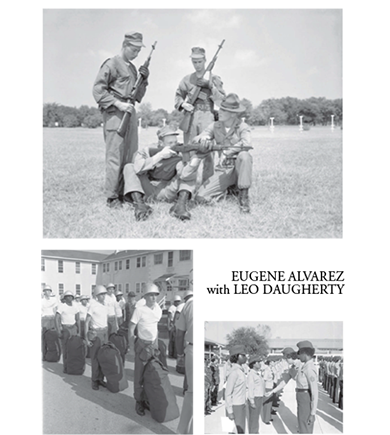
Copyright 2016 by Eugene Alvarez, Ph.D.
Library of Congress Control Number: 2016901542
ISBN: Hardcover 978-1-5144-5535-7
Softcover 978-1-5144-5534-0
eBook 978-1-5144-5533-3
All rights reserved. No part of this book may be reproduced or transmitted in any form or by any means, electronic or mechanical, including photocopying, recording, or by any information storage and retrieval system, without permission in writing from the copyright owner.
Any people depicted in stock imagery provided by Thinkstock are models, and such images are being used for illustrative purposes only.
Certain stock imagery Thinkstock.
Rev. date: 05/20/2016
Xlibris
1-888-795-4274
www.Xlibris.com
725466
TABLE OF CONTENTS
CHAPTERS
APPENDICES
CHARTS
MAPS
PHOTOGRAPHS
The original 1983 manuscript written by Eugene Alvarez, Ph.D., who is the primary author of this book, included the years 1562 - 1987. The current and revised manuscript edited and updated by Leo J. Daugherty III, Ph.D., in cooperation with the primary author covers the years 1987 to 2015, including chapter 6 dealing with recruit training in the 1920s and 1930s which was a part of his doctoral dissertation at The Ohio State University ( 2001).
Since this work was first completed, Parris Island has undergone numerous changes in buildings, the base layout and recruit training. The training philosophy has been altered as society demands. Thus, past training situations and methods should be observed as recorded in the chronological approach of the text to present times. For example, as late as the Vietnam War physical force was used in recruit training, as was hazing and cursing. Both are reasons for court-martials t oday.
The numbers and roles of women and minorities have greatly changed in recent times, and it should be remembered that Parris Island did not have a base open gate for large numbers of visiting civilians until 1956. Many current base facilities and luxuries were unheard of and not considered Marine Corps in times past.
Large numbers of depot buildings have been built and destroyed in Parris Islands history, so street names and building numbers are used whenever prudent in order for the reader to locate a site. Former base maps may be required to precisely locate a place. It has also been observed that at times personal recollections of former recruits and others conflict. In such instances the author has relied on his experience and the recollections of others to correct any dis pute.
Mistakes have undoubtedly crept into the initial and revised manuscript, but when found they are immediately corrected. Further, generous persons, who were not professional typists or computer operators have retyped the manuscript. Any and all errors in spelling, grammar, and content in this work are those of the authors who both take sole responsibility and offer any apology before hand.
Eugene Alvarez, Ph.D.
Professor Emeritus Leo J. Daugherty III, Ph.D.
Atlantic Beach, FL, January 2016 Master Sergeant, USMCR (Ret.)
Rineyville, KY January 2016
Eugene Alvarez, Ph.D., was born in Jacksonville, Florida, June 25, 1932. He enlisted in the United States Marine Corps on August 12, 1950, and received his recruit training in Platoon 99, First Recruit Training Battalion, Parris Island, South Carolina. Following boot camp, Private First Class Alvarez (1137622 USMC) was assigned to the Second Amphibian Tractor Battalion (1833 Tracked Vehicle MOS), Second Marine Division, Court House Bay, Camp Lejeune, North Carolina, where he remained until December 1951. As a member of the Seventeenth Replacement Draft, Korea, in February 1952, Corporal Alvarez reported to the First Amphibian Tractor Battalion, First Marine Division. During most of his year in Korea the unit was dismounted and employed as defensive machine gun companies along the Imjin River near the 38 th Parallel. Alvarez later received the Combat Action Ribbon (CAR).
Sergeant Alvarez returned to Camp Lejeune for a brief tour of duty in 1953, until he received requested orders for duty at the Marine Corps Recruit Depot, Parris Island, South Carolina There, he was assigned to the Ninth Class of the Drill Instructor School. (then - 4911 DI MOS). During 1953-1954, he served as a Junior and Senior Drill Instructor in the First Recruit Training Battalion until honorably discharged from the Marines in August 1954. Two years of college ensued, while Alvarez was a member of the United States Marine Corps Reserve in Jacksonville, Flo rida.
Sergeant Alvarez returned to Parris Island in June 1956 as a regular Marine. After completing his second Drill Instructor School in Class 43-A, he served for nearly two years as a Junior and Senior Drill Instructor in the First Battalion.(8511 DI MOS). He ended his enlistment as the Staff Noncommissioned Officer in charge of the First Battalion physical training field for a little over one year. He was honorably discharged from the Marine Corps with the rank of Staff Sergeant in April 1959, and served for a second and short time in the Jacksonville, Florida, Marine Corps Res erve.
Dr. Alvarez received a Bachelor of Arts degree in history from Jacksonville (Florida) University in 1961, the Master of Arts degree in history from the University of Mississippi in 1962, and the Doctor of Philosophy degree in history from the University of Georgia in 1966. Teaching and administrative duties followed at Gainesville (Georgia) College and Valdosta (Georgia) State College-University. From 1970 to 1973, Dr. Alvarez taught for the University of Maryland as a lecturer in Asia (including Vietnam), Europe, and the United States. In 1973 he returned to Georgia to serve on the faculty of Macon State College as a full and tenured Professor of History. He retired from the University System of Georgia, Professor Emeritus , at Macon State College in January 1995.
Professor Alvarez has published numerous articles in leading history and other journals, including Leatherneck magazine and the Marine Corps Gazette. He is the book author of the book Travel On Southern Antebellum Railroads, 1828 - 1860 , published by the University of Alabama Press in 1974.
In 1981, Alvarez received a grant from the Marine Corps History Center to research the history of Parris Island. The result was this unpublished manuscript for the Marine Corps History Center. Realizing the need and interest for a Parris Island history, Where It All Begins: A History Of The United States Marine Corps Recruit Depot, Parris Island, South Carolina , was published by Gayle Publishers in 1984. An updated edition was published by the author in 1992. Interest remained for the need of a Parris Island history, and in 1996, 1998, the author commercially self-published, Parris Island: The Cradle Of The Corps . Alvarez with Daniel Moyer published, Just the Facts, Maam: The Authorized Biography Of Jack Webb, Seven Locks Press, in 2001. Alvarez published Parris Island (a picture history) with Arcadia Publishers in 2002. In 2007, Dr. Alvarez published Once A Recruit, Always A Marine, with the History Press in 2007.
Leo J. Daugherty III, Ph.D., was a Master Sergeant in the Marine Corps Reserve before his retirement in November 2015. Born on October 10, 1956, in the U.S. Naval Hospital, Beaufort, South Carolina while his father, Private First Class Leo Daugherty Jr., was at the time a Marine serving with Schools Company at Marine Corps Recruit Depot, Parris Island, South Carolina at the time. Growing up in Cleveland, Ohio, and after a very brief period as a basic Marine recruit at Parris Island in the summer of 1975, he attended John Carroll University, where he received a Bachelors of Arts in History (1979) and later a Masters Degree in History (August 1985). He re-enlisted in the Marine Corps and completed Recruit Training at MCRD, Parris Island with 1060 Series, Company A, First Recruit Training Battalion on August 21, 1985. After completing Assault Amphibian School, Camp Pendleton, CA, with the 1833 MOS, he reported to the Second Assault Amphibian Battalion, Camp Lejeune, NC. Shortly thereafter, he lateral moved to the 0200 field, and was assigned to G-2 Operations, Second Marine Division, where, upon after graduation from The Navy Marine Intelligence Training Center, Damneck, VA., participated in Operation Ocean Venture , at Veiques, Puerto Rico in February 1987. He was assigned to the Third Battalion, Sixth Marines (September 1987 to April 1988) and later to Headquarters Company, Sixth Marine Regiment at Camp Lejeune, N.C. Leaving active duty in March 1989, Daugherty, then a sergeant, joined the Third Battalion, Twenty-Fifth Marines, headquartered in Brookpark, Ohio, where he served as the S-2 Chief until July 1991. Activated for Desert Shield/Desert Storm in January 1991, he reported to Camp Lejeune, NC, where his battalion participated in Battle Griffin 91, a NATO Cold Weather exercise. After leaving the Select Marine Corps Reserve, Sergeant Daugherty remained in the Individual Ready Reserve, where he participated in numerous Marine Expeditionary Unit/Special Operations Capable exercises from 1991-1995 at Camp Lejeune, NC; later, he served briefly with the Second Battalion, Twenty-Fifth Marines as an Intelligence Analyst for a Combined Arms Exercise at Twenty-nine Palms, California in July 1997. He drilled with Marine Corps Security Guard School from 1997 to 2001 at MCB, Quantico, VA., and later with Fourth Marine Expeditionary Brigade/Anti-Terrorism Brigade at Camp Lejeune, N.C., and finally, Company E, Fourth Tank Battalion, at Fort Knox, KY. Master Sergeant Daugherty completed his Ph.D. program in Marine Corps history at The Ohio State University in 2001. His dissertation is titled, To Fight Our Countrys Battles: An Institutional History of the United States Marine Corps during the Interwar Era, 1919-1935 , 2 Volumes (Columbus, Ohio, Ph.D. Dissertation, The Ohio State University, 2001). He was promoted to the rank of Master Sergeant in 2006. Also in January 2006, he was the recipient of the Colonel Robert Debs. Heinl, Jr., USMC, Award for his article, Bluejackets and Bolsheviks. As a civilian, Master Sergeant Daugherty works for the U.S. Army Cadet Command and Fort Knox, KY, as the Senior Command Historian. Daugherty has written twelve books which includes a history of the U.S. Marine Corps and the State Department (2009), and Fighting Techniques of a U.S. Marine in World War II (2001); and Fighting Techniques of a Japanese Infantryman, 1941 - 1945 (2002), The Battle of the Hedgerows (2002); as well as authoring numerous scholarly articles and book reviews. He and his wife are presently completing a two-volume history of the U.S. Marines and Counterinsurgency,1899 - 2014 ; and he is also working on a History of Company E, Fourth Tank Battalion titled Kentuckians A ll The Journey of a Marine Reserve Unit in Peace and War . His main field of study is the Marine Corps during the 1920s, 1930s, and 1940s. He retired from the Marine Corps in November 2015. Master Sergeant Daugherty is an adjunct visiting assistant professor of history at Alice Lloyd College, where he teaches Middle East, Latin American, and African History, along with his wife Dr. Rhonda Smith-Daugherty, who is Chair of the History Deparment there. The Daughertys live in Rineyville, KY and Pippa Passes , KY.
Next page
